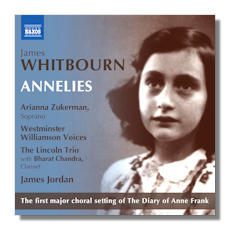
The Internet's Premier Classical Music Source
Related Links
- Whitbourn Reviews
- Latest Reviews
- More Reviews
-
By Composer
-
Collections
DVD & Blu-ray
Books
Concert Reviews
Articles/Interviews
Software
Audio
Search Amazon
Recommended Links
Site News
 CD Review
CD Review
James Whitbourn

Annelies
Arianna Zukerman, soprano
Bharat Chandra, clarinet
The Lincoln Trio
Westminster Williamson Voices/James Jordan
Naxos 8.573070
It astounds me that nobody has set this profoundly moving and historically seminal work to music before, but perhaps it makes sense. Annelies Frank spoke more clearly for her people and her plight than any music could, and that's saying something. At least, that was the case until now, because James Whitbourn is a terrific composer with terrific ideas. Still, terrific ideas do not a masterpiece make; it is Whitbourn's ability to realize those ideas and stay faithful to the text that he's able to turn a book into a painting.
The work is stunning in both its beauty and utter simplicity. Naxos and James Jordan have made the right choice in choosing the chamber version for release, and I say that without ever having heard the full scoring. But I suspect that this is the better choice. It has a deep, personal sense of intimacy, and the sparse but masterful scoring allows a great feeling of introspection and emotional involvement. Whitbourn knows exactly what he wants to do with this text, using the chorus, Zukerman, and his instrumentalists to tell the story in such a way that it just feels right. Zukerman sings beautifully, with real emotion, and the chorus clearly relishes the opportunity to convey such powerful words to us through music. James Jordan does a great job at shading the text and music dramatically.
I've heard other critics mention that it's not a perfect work; perhaps it runs too long or needs to convey something differently. I will agree it is imperfect, but in the most human, beautiful sense. For the work itself is all about imperfection, both as a musical piece and a diary. Whitbourn deserves a lot of credit for bringing this to us in such a heartfelt, genuinely touching way. If you care about Anne Frank, contemporary music, or the way we see life in general, this is an essential purchase. Thanks to all involved.
Copyright © 2013, Brian Wigman





















